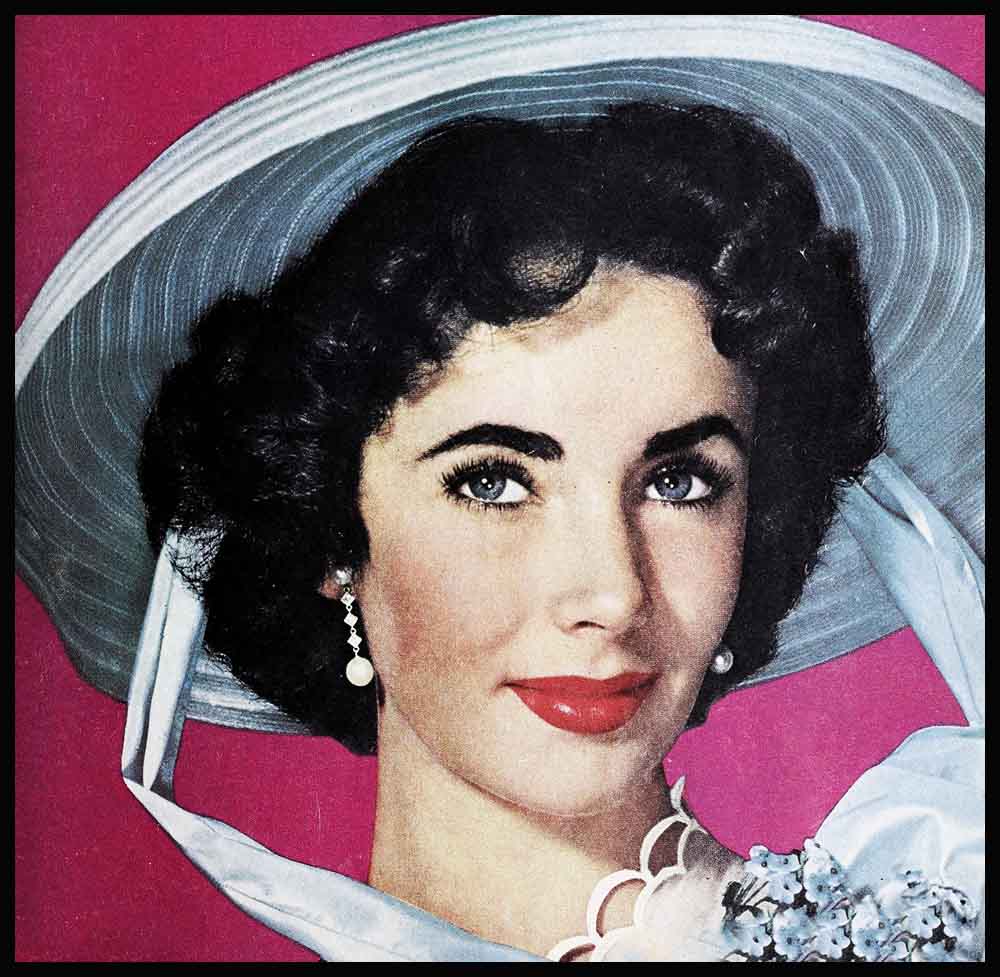
Elizabeth Spoiled Brat Or Mixed-up Teenager?
The fairy tale’s over, and the princess of dreams has told it to a judge. “Forever after” lasted not quite seven months. On May 6th Elizabeth walked down the aisle of the Church of the Good Shepherd, and one guy was heard to mutter, “If that’s how Helen of Troy looked, no wonder!” On May 6th she joined hand, heart and life to Nicky Hilton’s till death did them part. Their lips clung so long in the rapturous post-nuptial kiss that laughter rippled over the pews, but Elizabeth heard nothing till she heard Father Concannon’s gentle voice: “I think that’s long enough—” On May 6th the world was well lost for love. On December 1st it was a dead duck. Liz fled Nicky’s bed and board to take refuge, not with her parents, but with Marjorie Dillon, her stand-in and erstwhile bridesmaid. During the traditional season of peace and goodwill, the Hiltons were exchanging gilt-edged court writs. On December 22nd, Elizabeth filed for divorce.
AUDIO BOOK
At first, people refused to believe the darkening sky. Not this time, they groaned, not so soon, not for the bride of brides. But the storm signals thickened, and Nicky was elected bad boy. Nicky drank, they said; Nicky gambled-even on the honeymoon. One rumor had him chucking a handful of chips at his lady in Cannes—a story hotly denied by Elizabeth.

When she walked out on him, though, the tide started turning. Liz should have acted according to pattern and gone home to mother. They’ve always been close. Her father dotes on Liz. Brother Howard has been her ally from childhood. These were her natural protectors, but she bypassed them to go to Marjorie Dillon’s. Why? It must be that they frowned on the step she’d taken, so the talk went, and from this it followed that Liz must be at fault. Nick, after all, was a practising Catholic, his marriage vows sacred. No one had known him to drink in his bachelor days except as a gentleman drinks, and, if he gambled on the Riviera, who doesn’t?
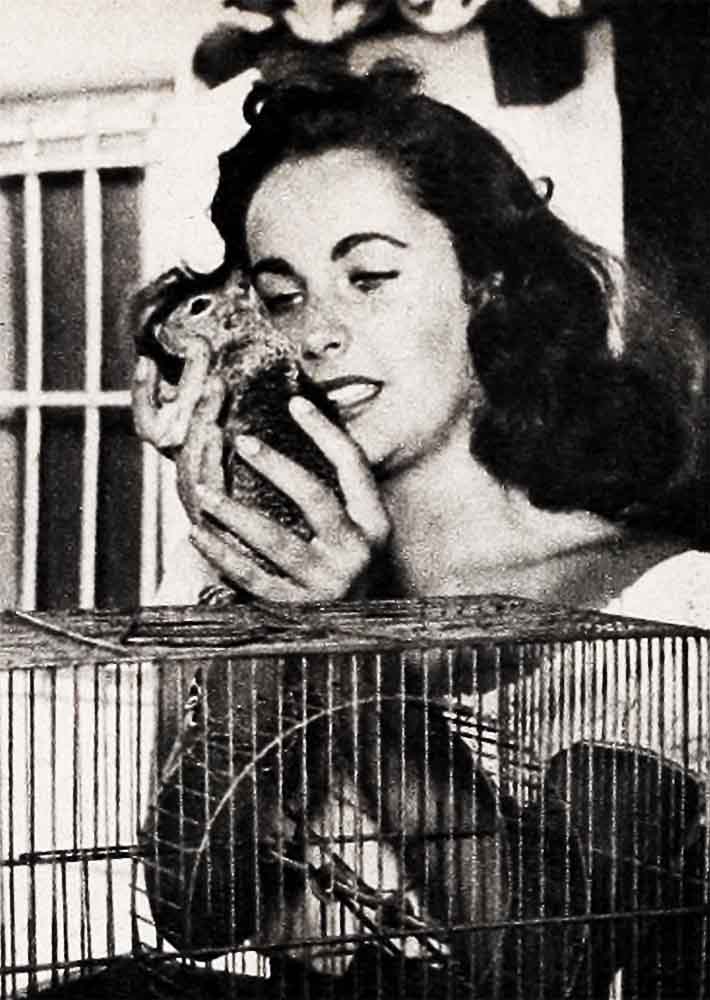
In print, sweet Liz turned willful, flighty and headstrong. Especially after her appearance at a premiere with Stanley Donen, director of “Love Is Better Than Ever.” Donen has been separated from his wife for about a year. No other girl on his arm would have caused a ripple. Liz created a riot. With the rift from Nicky so new, she should have stayed at home, preferably weeping.
Against the hue and cry, M-G-M took A over. It’s entirely possible that Liz suffered a nervous collapse. She’d gone through emotional upheavals aplenty, and she’s sensitive to a bad press. In any case, such was the story when news hounds sniffed out that Rebecca Jones, entered at Good Samaritan, was the one, the only, the captivating Taylor. Each morning they whisked her to the studio for a day’s work, each evening they whisked her back to the hospital. Then flu laid her low, and of that there’s no manner of doubt, for the set was shuttered, and you don’t shutter sets in Hollywood for mythical ailments.
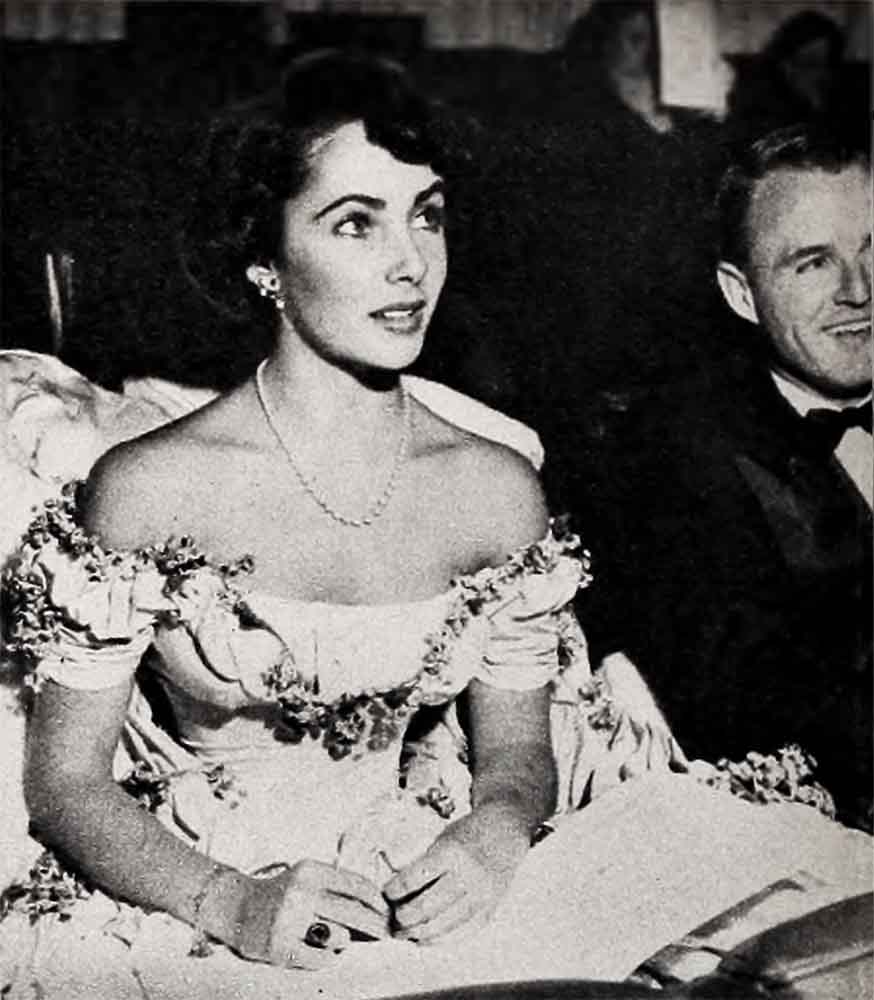
Those who craved tears from Liz should have been satisfied on January 29th when her suit was heard. “Will you tell the court briefly,” her lawyer asked, “what your husband’s conduct was?”
The dark-fringed eyes looked scared. “He was indifferent to me and used abusive language and—”
“I can’t hear a word,” protested the court reporter, two feet away.
The judge made a small joke. “Pretend my reporter’s a little hard of hearing.”

The kindness of the judge, the laughter of the court or her own tensions proved too much for Elizabeth. Down went her face into her gloved hand. So bitterly did she sob, that the lawyer asked and received permission to put the testimony into the record for her. Was it true that almost from the beginning of their marriage, Hilton had been indifferent and argumentative and picked fights for no apparent reason? Was it true that he spent most of his time away from her on their honeymoon, staying at the casinos till five or six a.m. and forcing her to go home alone in a cab? Was it true that this conduct continued after their return, causing her to grow nervous and to lose weight?
Liz assented. She recovered sufficiently to give an example of Nick’s rudeness. While unpacking at the Bel-Air Hotel, with her mother and Barbara Thompson present, Nick had come in and said, “What the hell’s going on here?” Barbara (Marshall’s wife) verified the incident.
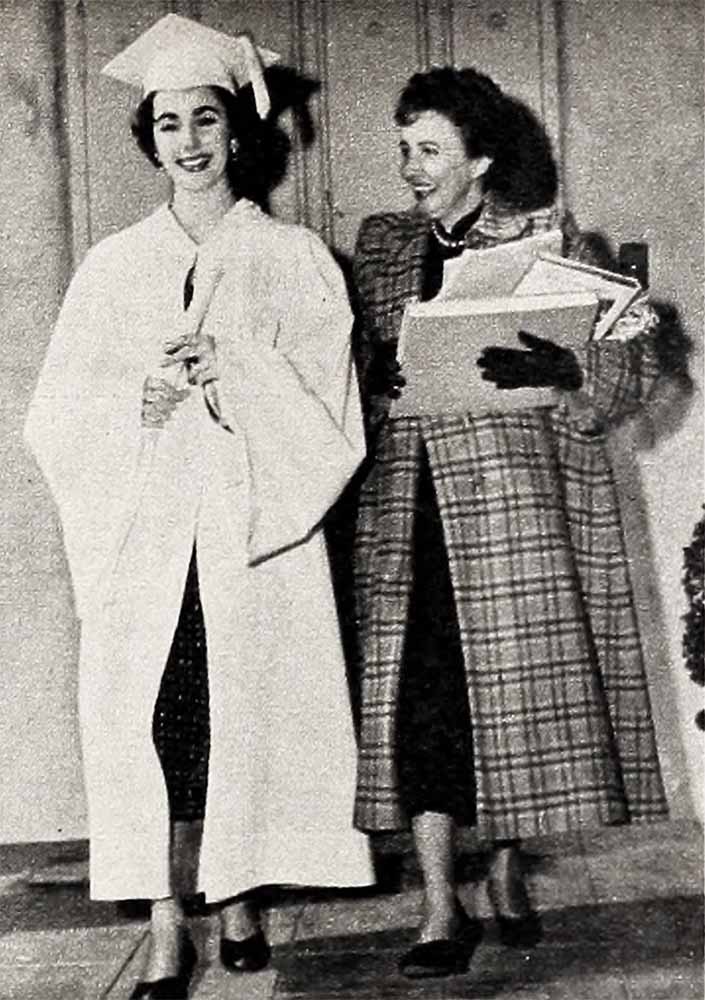
Though a property settlement had reportedly been arranged, Liz waived alimony and asked for the return of her maiden name. Hilton’s lawyer filed formal denial of the cruelty charge. A nisi decree was granted, to become final within the year. Her ordeal over, Liz broke down again, burrowing like a forlorn puppy against her agent’s coat. Hardboiled newsmen, remembering the radiant face of a few months back, sighed for lost illusions. Liz was led to the judge’s chambers. On emerging to face reporters and cameras, she seemed to feel better. Her reply to questions about Stanley Donen was variously quoted as “absurd” and “a lot of applesauce.” Next night she went dancing with him at Mocambo.
Some call Elizabeth spoiled, some say she’s mixed up. At the height of the hearts-and-flowers dither, an older woman who knows her well and likes her, spoke her independent piece. “Elizabeth shouldn’t marry yet. She’s emotionally immature—”
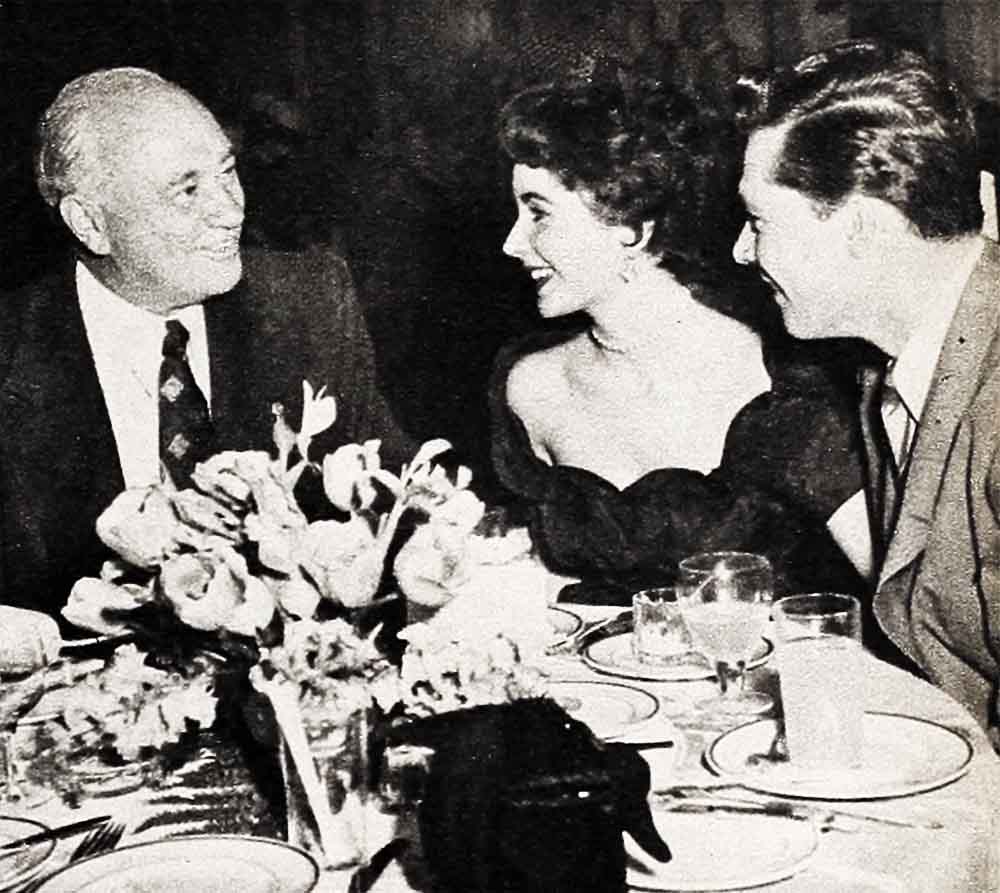
“Immature?” gasped the hearer.
“I said, emotionally. Physical and emotional maturity are two different things.”
It would be a small miracle if Elizabeth weren’t spoiled. Imagine yourself in her place. At fifteen you’re the darling of M-G-M, the focal point in a world of glitter and stardust. You work, yes, but your work thrills and excites you. Great names, who wouldn’t otherwise know you exist, seek you out and make much of you. Whose head wouldn’t be turned?
Elizabeth’s also mixed up. In spite of Glenn Davis, Bill Pawley, Nick Hilton I don’t think she knows the meaning of love. I don’t think she’s had a chance to learn. She’s been too closely supervised, pursued too ardently, caught up too swiftly in the delights of romance. There was no time or peace for self-searching.
Glenn Davis was the first to make her heart beat faster. She was sixteen. Comic books still enthralled her, school was a bore, chattering and dreaming were her favorite pastimes. Like any teenager, she was overwhelmed by attention from the national grid hero. One day he invited her to an exhibition game. Liz sat in Glenn’s box, thrilled to his dazzling feats, shared his triumph as the crowd hoisted him aloft, “I stood there,” she told her mother, “and wanted to shout, I’m with Davis, I’m with Davis.’ ”
By contrast with the boys she’d dated, Davis was a man and must have made love like a man. I’m sure she thought she was serious. Glenn had stirred budding emotions, personalized the adolescent’s dream. He became a symbol. Inexperienced Liz mistook the symbol for the man. Making “The Conspirators” in England, she wrote to him often, talked of him freely and danced gaily with other men. The advantage of a symbol is that he’s not around to cramp your style.

Later she pooh-poohed the whole Davis episode, and insisted that the press had made a mountain of it. But it wasn’t the press who hung Glenn’s football round her neck. It wasn’t the press who wrote letters from London to her father (for publication) with Glenn’s name as the theme song. Nor was it the press who sent her flying to his arms when his plane landed. That was an ill-timed kiss. Hard on its heels came news of her betrothal to Pawley. Official explanations had her meeting Glenn for auld lang syne and to let him down easy. I wonder what they call hard.
The Pawley romance broke up on altogether different grounds. The marriage Elizabeth had planned to Glenn was a mirage—three comfortable years away. Pawley was twenty-nine, he’d won his prize, wanted her for his wife and no foolin’ around. Eligible from every point of the compass, he sprang one flaw. With his life and business rooted in Florida, he didn’t propose to transfer them elsewhere. Liz didn’t love him enough to say, “Whither thou goest—”
One story written around her wedding day, when all that touched Liz had to touch her tenderly, says the Pawley bust-up stemmed direct from terror. Liz had gone out on an errand with a friend of Bill’s, and returned later than expected. She found her fiance “livid with rage and jealousy. He bustled her into his car and roared away on a mad reckless drive that could have ended tragically. Stamping out his anger at the gas pedal, he showed Elizabeth a weakness she hadn’t suspected—an ungovernable temper. When he brought her back at last, she was shaken trembling and afraid. That was the end of their engagement—right then—”
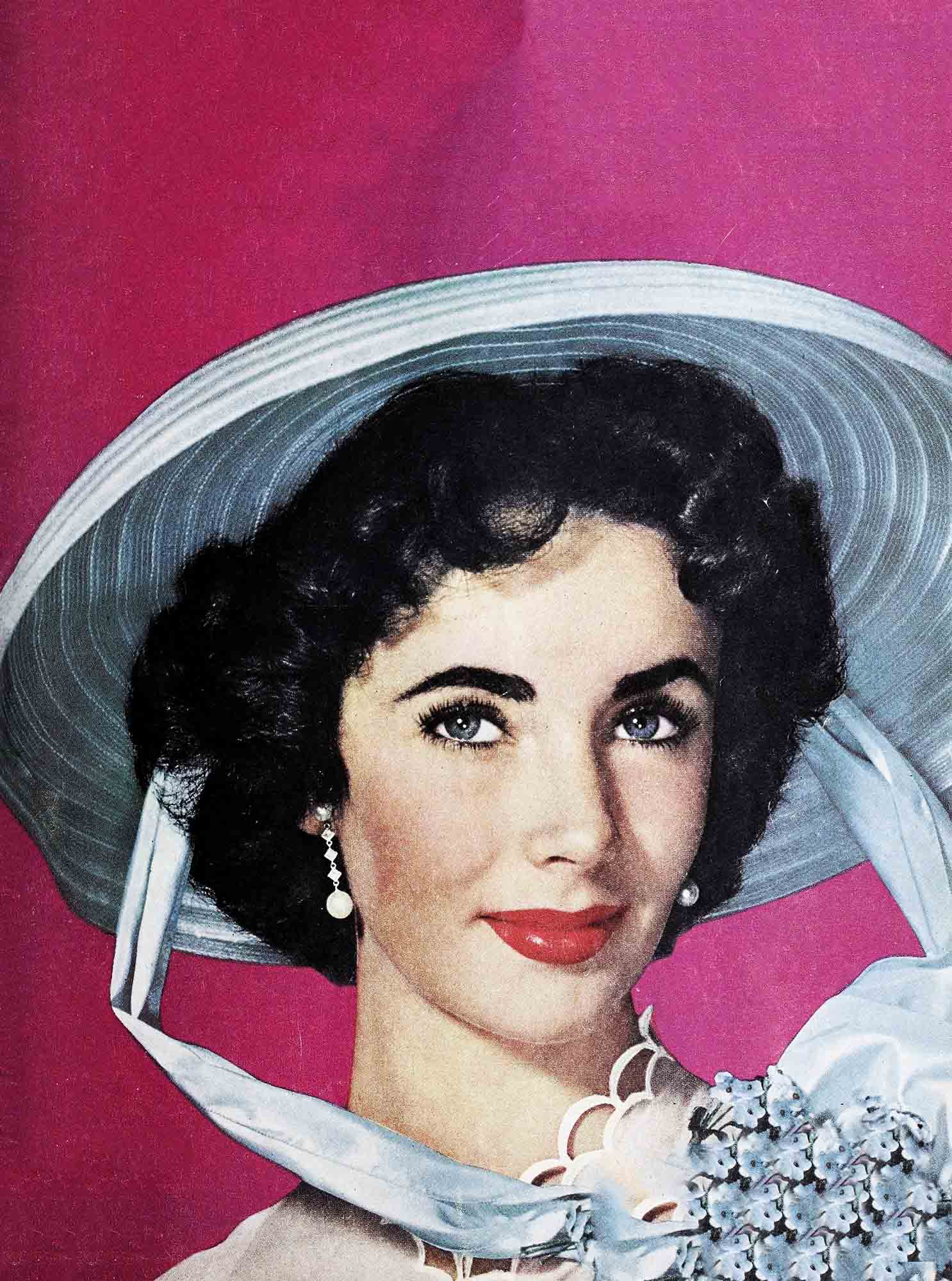
It’s a hair-raising tale, and I find it hard to square with an encounter of my own. I interviewed Liz one day in California. Bill’s ring was on her finger. She showed it proudly, talked on and on about Bill, their hoped-for marriage in the spring. She was childlike in her candor and wistfulness. It was hard not to date, though of course she didn’t want to date anyone but Bill. They hadn’t been able to figure their future yet. Maybe Bill could start something in California. “For a while I thought I could quit pictures and be a little housewife. Now I know I can’t. But, oh dear, I miss Bill so much I could just about die—”
Two weeks later the engagement was off—terminated not at the close of a wild drive in Florida,but on her home grounds, For all I know, Pawley’s temper outclasses Nero’s. His photographs show a resolute face. But if the girl I talked to was afraid of him, I’m Harvey. She put her own finger on the sore spot. “I thought I could quit pictures, but I can’t.” She and Pawley called it a day and her heart wasn’t broken—only scratched by carpers who failed to understand.
Free as a butterfly, she started dating again. Most girls, burned twice, might have paused to make sure and doubly sure before entering the holy bonds. But most girls don’t flatten men as Elizabeth does. And this time conditions were idyllic. Nick was young, attractive and mad about the girl. Unlike Davis, he had wealth behind him I don’t mean for a minute that Elizabeth married for money. That’s the least of her worries. I do mean that marriage to a movie star poses fewer problems to a man of independent means. Unlike Pawley, Hilton’s job lay in California. “Nicky,” Liz caroled, “wants me to go on with my work.”
Yet hardly had the sound of wedding bells died on the air when the sound of battle arose. They’d been married in a Catholic church by a Catholic priest. Obviously, Hilton expected their union to last. So, I feel sure, did Elizabeth. It couldn’t have been a trifle that blasted them apart. Well, Elizabeth’s career is nobody’s trifle.
But Nicky knew all about it beforehand Liz made no secret of her screen ambitions, so where was his beef? I’ll answer that with another. Is Hilton the first to discover that heaven has little in common with earth? Publicity? Sure. A few pictures now and then? Why not? Of course their private lives would be their own.
Europe made it plain that their private lives could be dumped in a flea’s ear, with room to spare. Elizabeth loved the fanfare. Nicky went along with it up to a point, but it stuck in his throat. That he made his wife unhappy, there’s no denying. Too many eyes bore witness to Elizabeth’s tears. That he turned “indifferent” overnight through pure cussedness is, according to his friends, so much malarkey. He must have been good and unhappy himself.
I don’t know Nicky Hilton. Those who do say he’s an earnest Citizen, forging his hardworking way into his father’s hotel kingdom. If you point out that their earnest Citizen got himself mixed up in one of those senseless cafe brawls they answer, so what? To Hilton’s defenders, it proves nothing except that the crash of his marriage hit him hard. After the fracas, a spokesman plaintively begged reporters to refer to Nicky as Nick. “After all, he’s grown up. . . .”
“Want to lay a bet?” inquired our sporting newsman.
Okay, Nicky didn’t like the fishbowl. But his real unhappiness, by general belief, involved a more personal problem. All you need do is read between the lines of the stories. Again and again it pops up like a hopeful refrain from Nicky. “Naturally we don’t want to wait too long for children. My brother’s a year and a half younger. He has two, with another on the way. I can’t let him get too far ahead.”
And Elizabeth’s voice in counterpoint: “We don’t want children for two years yet. Nicky and I want to have lots of fun first.”
At this stage I doubt Adonis in modem dress could make Elizabeth give up her career. Not the Liz who begged on her honeymoon for a day’s work in “Quo Vadis” or told a writer naively: “I could have come back earlier to star with Laurence Olivier in ‘Carrie.’ But that wouldn’t have been fair to Nicky.” As a rule, it’s not fairness that keeps a girl close to the side of the man she loves.
Grown-up love has the other’s happiness at heart and adjusts any differences that arise. Children could have waited—or they could have come without hurting Elizabeth’s career. Look at Jeanne Crain, Betty Grable, Esther Williams. But her work evidently meant more to Liz than Nicky, and his ideas on marriage meant more to Nicky than Liz.
Nobody takes Donen too seriously, and the story is that they’re consoling each other. The direct Miss Hopper put a question direct to Donen. “If you were free to marry now, would you marry?”
Answer: Quote I doubt it unquote—
Maybe her new bid for freedom is the beginning of Elizabeth’s maturity. once, when Nicky acted up at a party, she reportedly wailed: “I was pushed into this marriage.” If that’s what she said, it was the plaint of a child unwilling to face up to her own mistake. She’s faced up to it now. Probably against the judgment of all her advisers, she found the courage to make a major decision. She knew the storm of disapproval it would raise, and she’s taken disapproval hard. Nevertheless she stuck with it. To think for yourself can be habit-forming. It’s a sign of growth.
Love dies every day. After twelve years it died for the Bob Taylors, and for the Robert Montgomerys after twenty-two. They rated a paragraph on the back pages. Elizabeth made the headlines, which is understandable.
For when she stood there in her bridal robes, so young, so beautiful and beloved, she was more than herself. She was hope and mystery and wonder. Kids with dreams in their hearts hugged them closer. Older people remembered an ideal of happiness—gone for them perhaps, but not gone from the world because Elizabeth would live it. Well, she didn’t . . .
It’s a pity. But people should know better than to set other people on pedestals. They should know that springtime doesn’t last forever. And what’s wrong with summer?
THE END
It is a quote. PHOTOPLAY MAGAZINE MAY 1951
AUDIO BOOK




